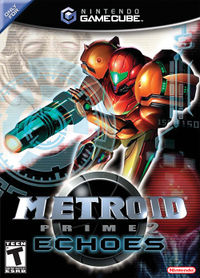From NintendoWiki, your source on Nintendo information. By fans, for fans.
| Metroid Prime 2: Echoes
|
メトロイドプライム2: ダークエコーズ
Metoroido Puraimu 2: Dāku Ekōzu
|
|
|
|
|
| N. America:
|
November 15, 2004
|
| Japan:
|
May 26, 2005
|
| Europe:
|
November 26, 2004
|
| Australia:
|
December 2, 2004
|
|
|
|
|
|
Metroid Prime 2: Echoes is the second Nintendo GameCube installment in the Metroid series, developed by Retro Studios and released in 2004, and is the follow-up to Metroid Prime.
Blurb
A War of Light and Darkness
Become the bounty hunter behind the visor once more! Hunted by a mysterious entity and a warring race called the Ing, Samus Aran must explore the light and dark worlds of a doomed planet, but time runs short...
Tons of new power-ups await, including the Dark and Light Beams, which make use of an all-new ammo system.
Travel through portals between Light and Dark Aether as you explore massive worlds crawling with enemies.
Scan environments, upgrade your suit and visors, and explore every nook and cranny in Morph Ball mode.
Plot
Samus Aran has been sent by the Galactic Federation to the planet Aether to assist a group of Federation Marines that went missing several days ago. Her ship is damaged in a storm on entry, and soon after landing comes across the corpses of the marines she was sent to back up, as well as a dark entity that starts to reanimate them and attack her. Soon after that, Samus comes across a dark figure resembling herself, which heads into a portal to an unknown destination. Following it, Samus is quickly overpowered by even more creatures and leaves.
In the Great Temple, Samus learns from a surviving inhabitant of the Luminoth species that, long ago, the planet Aether was struck by a meteorite carrying dark energy, which split the entire planet into a "light" half and a "dark" half, and the Ing on Dark Aether waged war with the Luminoth, stealing their planetary energy. Samus has managed to retrieve the Energy Transfer Module, which allows her to control the planetary energy of Aether, and now must assist the Luminoth by retrieving the energy from Dark Aether and returning it to Aether.
Gameplay
Much of the gameplay of Metroid Prime has been carried over into this game. The game is a first-person adventure set on the planet Aether, in which the player must explore a variety of locations to find upgrades and ultimately restore all of Aether's planetary energy. Samus's HUD displays her current health, her current location (the map can be expanded), and her current beam and visor (which can be switched with the C-stick and D-pad respectively. At a certain point in the game, the player will acquire the Dark Beam and the Light Beam, which are required for puzzles and have limited ammunition.
Throughout the game, the player will need to locate and enter portals leading to Dark Aether, a parallel version of Aether. Dark Aether's atmosphere is toxic, which constantly drains Samus's health, though crystals and balls of energy scattered throughout the planet provide save areas.
As with the previous game, the New Play Control! and Trilogy releases of Metroid Prime 2 make use of the updated pointer controls of Metroid Prime 3: Corruption.
Technical details
Other releases
| Title
|
Cover art
|
Platform
|
Release date(s)
|
Notes
|
| New Play Control! Metroid Prime 2: Dark Echoes
|
|
Wii
|
2009
|
An enhanced port of Metroid Prime 2: Echoes for the Wii released exclusively in Japan, using several features from Metroid Prime 3: Corruption such as the pointer control scheme, the credit system, and the ability to take in-game screenshots. This version also reduces the difficulty from the original release.
|
| Metroid Prime: Trilogy
|
|
Wii
|
2009
|
The New Play Control! version of the game, released outside of Japan for the rest of the world.
|
| Metroid Prime: Trilogy
|
|
Wii U
|
2015
|
A port of Metroid Prime: Trilogy released as a digital download on the Wii U Nintendo eShop.
|
Trivia
- Metroid Prime 2: Echoes is the only Nintendo GameCube game published by Nintendo in the PAL region to lack support for 50Hz televisions.
External links

